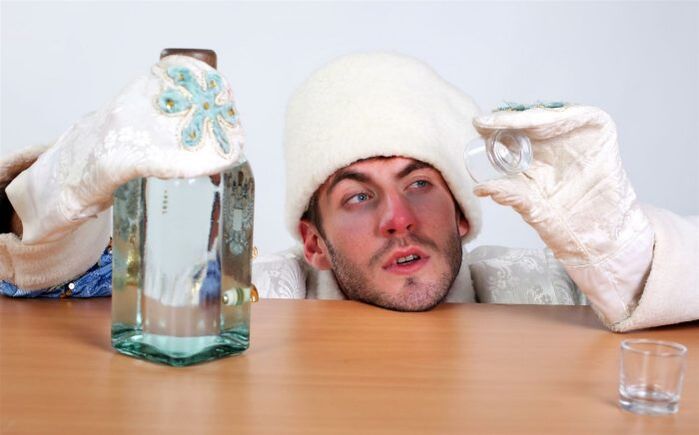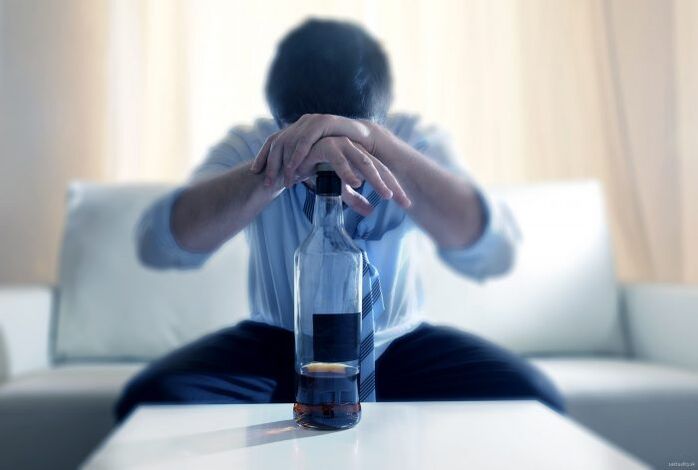Alcoholism is one of the most talked about topics. It threatens family relationships and society as a whole. Not surprisingly, after a while, the patient's relatives wonder how to get the person to stop drinking?
Reasons for alcohol addiction
Before figuring out how to help a person stop drinking, you need to understand why they are drinking. By isolating the cause, you have a better chance of healing the person's belief. More often, the onset of alcoholism is a psychological addiction, so it is important to help a person understand that this is an addiction, not a habit. In most cases, there are four reasons why people start drinking:
- for the company;
- Reduce stress;
- Boredom;
- out of habit.
A popular reason a person begins to suffer from alcoholism is to drink for the company. Being the only teetotaler among friends makes it difficult to maintain an unyielding demeanor. For some, especially young people, it is a point of honor to support the company in this.

When a person is not surrounded by a rainbow environment and constant problems at work, they start drinking alcohol to relieve those stressful pressures. When you drink strong feelings or negative emotions, it may appear for a second that the problem doesn't exist. In fact, it won't go anywhere if you don't make a decision about it. Therefore, in such a situation, a possible way out must be found. Once the high is over, the person falls into negative emotions again and concludes that to avoid them, one must not stop drinking.
Drinking out of boredom is a loose concept. This is not a short-term situation in which a person has nothing to do. We are talking about a long period of time during which a person is faced with a situation that does not allow them to use force to focus on something specific. More often in this state, a mechanism is triggered that helps to reconcile with oneself.
The most dangerous reason why it is difficult to answer the question of how to help an alcoholic stop drinking is habitual alcoholism. In this case, it is difficult for a person not to drink, since the habit has become commonplace for them, and it is already difficult to imagine their life without them. In this case, the motivation to stop drinking must be very serious, otherwise it will be almost impossible to convince a person to stop drinking.

It is often very difficult to identify a single cause of the addiction. All of this is tightly interwoven and works in conjunction with one another. When alcoholism reaches its terminal stage, we speak of a physical craving for alcohol. In this case, help with alcoholism without medication is impossible. If a person wants to get rid of the disease on their own, it will be of great help in further treatment.
Does persuasion work?
How do you make an alcoholic heal? In fact, there are many ways to stop a person from drinking. The most popular way is to convince the person to stop drinking alcohol. This is a gentler way of helping him.
You can get an alcoholic to quit in more radical ways - this is a nervous shock after drinking. This segment also includes patient intimidation. The third area of help is adding various drugs or folk remedies to food. Before understanding how to help a person who is drinking to stop drinking, it is a good idea to find out what form of alcoholism is going to lie down, what exactly was the person becoming addicted to.

Since adding some medicinal or folk remedies to food is a very radical method that requires caution and prior consultation with a doctor, it is worth starting with milder methods, especially you need to help the alcoholic with conversations.
During these conversations, it is worth getting the person to stop drinking alcohol. The most effective means of convincing an alcoholic to seek treatment will be in the first stage of alcoholism, when the person has not yet lost the ability to critically perceive reality.
Before starting a conversation, think about the facts that you are going to give the alcoholic. If he's drunk and sees how awful it looks from the side, it may drive him to make radical decisions. Maybe he wants to stop already, but the willpower does not allow for a "really important" reason.
How do you convince an alcoholic of the harmfulness of his habit? It is best to get family or friendly advice. Only the closest people whom the person trusts should be present in this conversation. In the first stage, it is easy to wean a person off of alcohol. It is enough to tell him about his drunken behavior, to show him a tape from a recent party. If a person has not yet lost the ability to think appropriately, they will become afraid and ashamed of their behavior and will stop drinking.

It would be nice to remind you of a hangover, especially if you can't spend time with your family or whatever the sick person likes. It is important that every habit must be kept, which means money is being spent on it. Make calculations by translating them into movie trips, kids rides, and other activities.
It is important to prepare in advance that your attempts to figure out how to stop drinking will be perceived with hostility, resentment, and quarrel. In this case, it is very important to remember the answer to the question. Is it possible to break out into a scream or, conversely, freely consent to the conditions put forward by the patient? Under no circumstance. It is better to explain in a calm voice that no one is going to force anyone, but why not pay attention to the alternatives available.
If you have managed to move away from the theory of how to convince a person to be treated for certain results, then in no case do not let them down in such a situation. Support further, maybe he doesn't know how to wean himself off the addiction. Not everyone can stop drinking at home. Find a suitable clinic, make an appointment with a doctor, help the person get there. A person who stops drinking needs help more than ever.
Other options
One of the undesirable options is intimidation, when thinking about how to help it is so difficult to stop drinking and there is added stress too. It must be understood that this working technique can lead to the opposite effect.
This method is only suitable for patients who correspond to a certain psychotype. Some may experience this behavior with aggression, which is clearly not the best response.
Not always persuasion, arguments, intimidation. Sometimes this is not enough when the alcoholism has already moved into a deeper stage. In this case, you need to use special drugs. These can be ordinary drugs or something from folk recipes.
With the help of drugs of industrial pharmacology, it is possible to develop a feeling of aversion to alcohol in a person who drinks. Such methods are available even when a person does not know they will accept them, although the desire to get rid of the addiction right away will help achieve more.

Drugs are added to alcohol or food. This often leads to a deterioration in well-being immediately after drinking alcohol. After a few such cases, the alcoholic begins to associate the bad condition with alcohol and start thinking about stopping drinking.
The drugs used for such purposes contain disulfiram or cyanamide. As a result, the body cannot process ethyl alcohol normally. Decomposition products accumulate in the blood, which becomes the cause of persistent poisoning.
As soon as you notice the effect of the drug during this therapy, it is advisable to have another conversation and ask the alcoholic for treatment. It is important to describe the benefits of inpatient treatment:
- Relapse prevention;
- psychological help;
- constant monitoring of health status;
- Restoration of internal damage.
The best way to get rid of the addiction is to get treatment in a hospital, where the patient is constantly monitored by a narcologist. The lowest number of relapses is observed with this treatment.
Stages of alcoholism
Alcoholism is usually divided into three stages, each of which is believed to have specific symptoms and a range of health consequences. In the first phase, it is more difficult to identify the problem based on the person's appearance. Unbeknownst to himself and those around him, a person gradually increases the dose of what he drinks, as a certain experience is gained that does not allow him to achieve the desired level of intoxication with the same doses of alcohol.
Even in such a condition, a person is unable to stop drinking unless advised of the problem. After a person has drunk, they begin to experience nausea and vomiting. Very often the patient has memory lapses, he cannot remember what he did last night. Memory loss is partial.

As a result, after the first stage of alcoholism, a person faces a steady increase in alcohol consumption. At the same time, a schnapps can be repeated two to three times a week. The problem in this case is the lack of caring for a loved one and, with it, the worsening of the addiction.
As a person moves into the second stage of alcoholism, the outward signs become more noticeable. The first binge eating, which occurs when a person drinks alcohol for even two or three days without a break, speaks of the formation of second-degree alcoholism. At that moment, a physical form of addiction begins to form.
The person begins to develop a hangover as this is the only way to alleviate the condition. Such symptoms are clear signs of the second stage of the disease. In addition, the person suffers from constant weakness, headache, dizziness, nausea, and sweating. An uncomfortable tremor begins to penetrate the whole body, initially it is expressed on the hands. The second stage can take years, up to two decades, but can be limited to two years. In the final phase of the second phase, a person no longer has the opportunity to cope with the problem himself, only a doctor will help.
The last stage is the third. When educated, anyone can see a person as an alcoholic. The appearance begins to change. A person's face is constantly swollen, and a kilometer away it stinks of alcohol. At this time, a lot of chronic diseases, psychosis in severe form, and other problems are manifested. In such a state, people are usually already without a family or surrounded by people in the same state. In the third stage of alcoholism, a person loses his social position, the ability to think critically. A return to normal life is unlikely in this case.


























